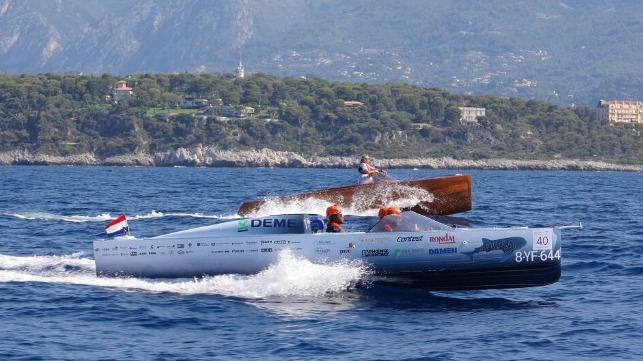Student Team Plans to Win Monaco's Open Ocean Green-Power Race

Every year, TU Delft's Hydro Motion program gathers together an elite team of engineering students to design, build and race a sustainably-powered boat that pushes the envelope of existing technology. The boats race in the premier Open Sea Class of the Monaco Energy Boat Challenge against commercial boat manufacturers, and last year they took home second place. This year the team intends to take home the gold.
To learn more, TME spoke with Hydro Motion's 2023 operations manager, Mandy Vermeijs.
To start off, do you think you could tell us a bit about yourself?
Sure. My name is Mandy, I'm now 22 years old and I finished my bachelor's here at TU Delft. I did my undergraduate in design engineering and I have started my master's degree in strategic product design.
I decided to take a gap year and gain an experience that was really unique, and so I applied for the Hydro Motion team. It's quite a hard application, but I got it and that's amazing. My function this year is operations, and my responsibility in this is in finance partnerships and external communication. In this team we get selected on our motivation rather than our existing knowledge, so you get to learn something entirely new very quickly.
Can you tell us about your partnership arrangements?
We are have hundreds of partners. Most supply us with the things, capabilities and collaborative relationships we need. For example, the production location for the boat is at one of our partners' facilities, and we have another partner that is supplying us with carbon fiber.
We also have financial support from some partners, because of course you still need money. A lot of them are maritime or sustainability connected, and we have relationships with big names like Deme, Damen and Feadship.
Can you tell us about how Hydro Motion selected hydrogen as its green fuel of choice?
When we started the foundation in 2006, we started as a solar boat team, but we decided to take it up a notch. In 2021, we built and raced the first hydrofoiling hydrogen powered boat.
We decided to change to hydrogen because we wanted to go offshore. We had to enlarge our boat so it's able to survive in the sea, and then we saw that when it became so large, solar was not enough to power it. We started looking at other green solutions and found that hydrogen was the best fit. It has so much energy in it: we only have 16 kilograms of hydrogen on board, but we can sail almost 215 nautical miles. A battery-powered boat cannot compete with that kind of range.
Building a groundbreaking hydrogen-powered boat with unbeatable range was a great accomplishment, but the race we are competing in has three trials: speed, maneuverability and endurance. This year we want to win all three.
The 2022 Hydro Motion team and its monohull design (above)
What do you plan to do differently with the design this year?
Last year's design was a monohull, and we are iterating on it to increase its potential for stable foiling - that is, flying above the water. Last year's design had trouble foiling, and they stayed in the water.
This year, we want to once again fly above the water with our boats because that brings high efficiency. We can go way further with it because you use less fuel.
We are also structuring our timeline a bit differently. We saw last year that for foiling you need a lot of testing - there is a lot of fine tuning and that takes time. So we have started our project earlier than last year's team, and we have allowed for more testing time. We'll hit the water in April and that will give us three months of testing before the race in July.
More broadly, this is an opportunity for us to test the boundaries of innovation and the state of the art. And that is why our partners are so involved. They are a platform for us to achieve our goal, but they also can take over where we stop. We show what is possible and they can take the lessons into their own projects.
Do these partnerships also create opportunities for the program's members after the year is over?
Yes, you do see that a lot. We have so much personal contact with these companies - you can call and email them any time, and that kind of relationship helps our members build connections that last past the program.
The same is true with past years' team members. We have review sessions that we invite everyone to join, and you'll see alumni from five, 10 years back attending. You can always reach out to them.
How can maritime companies and professionals get involved if they're interested?
Funding is always appreciated, and we're open to partnering with companies from around the world. We have partners in China, Italy, Norway, Belgium, the U.S. and England. Location is no obstacle.
Any closing thoughts?

that matters most
Get the latest maritime news delivered to your inbox daily.
I'd say that what we are doing is truly unique. We start the year as engineers and come out at the end of the year as engineers for a sustainable future. And that's such a difference.
We're also convinced that we will become world champions this year. The race will be against commercial companies, and we will be the only student team - and we will win.
